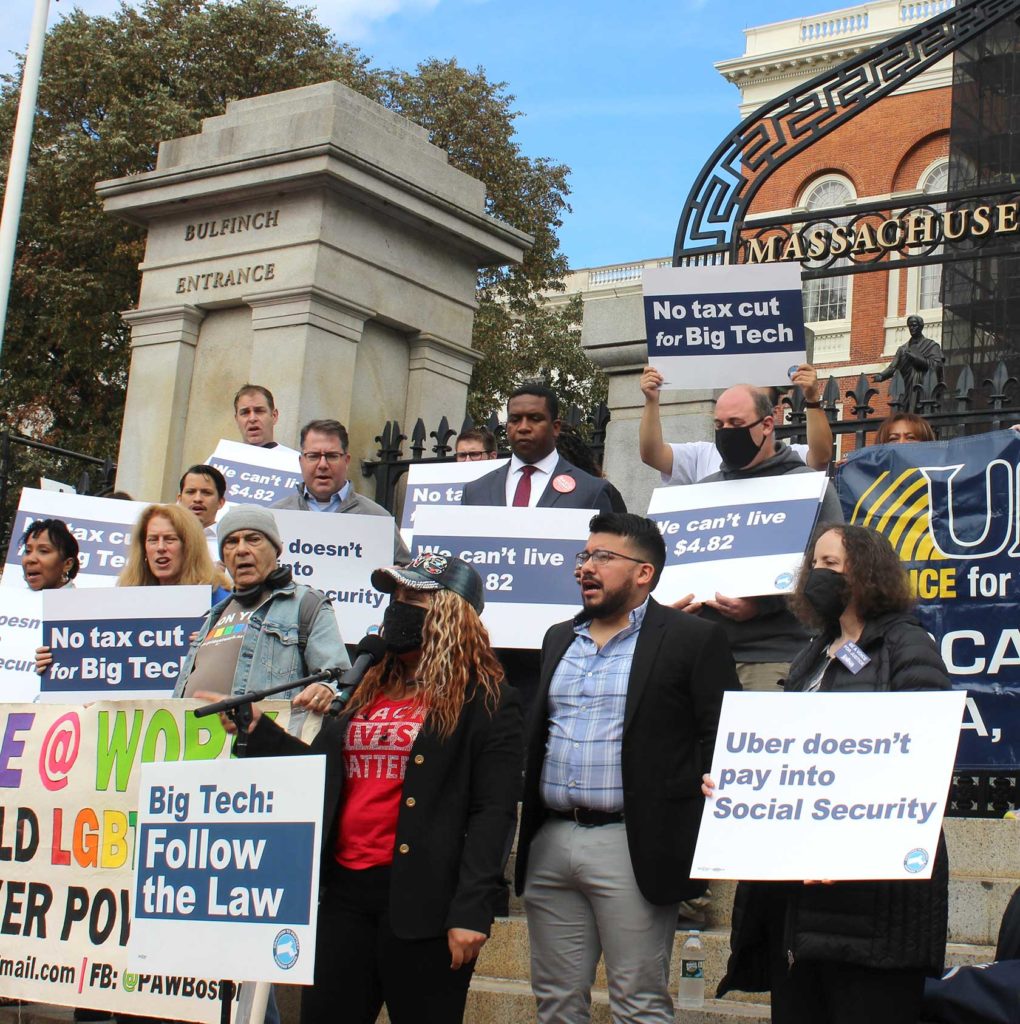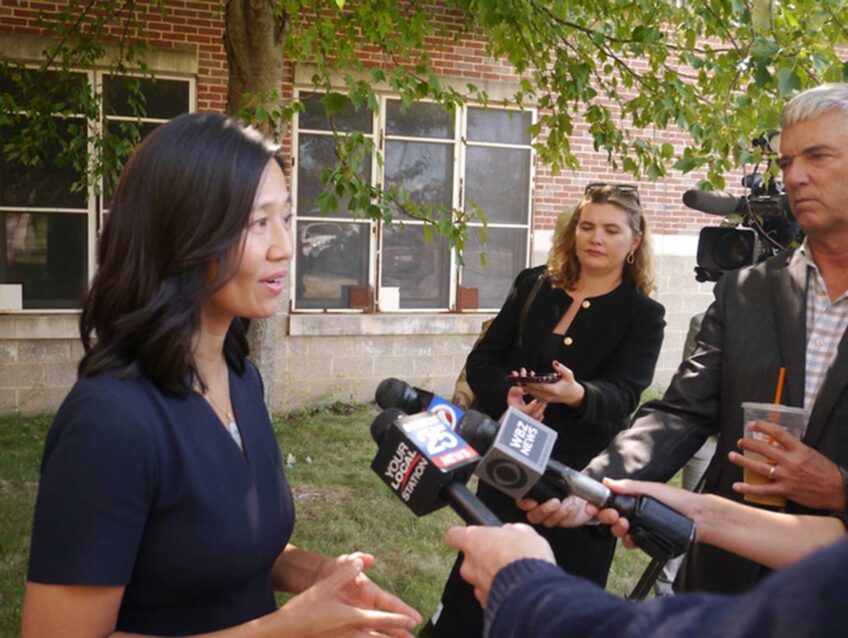Drivers debate rideshare legislation
Bill would classify drivers as contractors

Labor activists, elected officials and drivers for ridesharing services like Uber and Lyft joined together on the steps of the State House last Wednesday in vocal opposition to legislation introduced earlier this year that would change the employment structure of app-based drivers. The action was immediately followed by a virtual hearing on the matter.
Being scrutinized in particular was House Bill 1234 and its accompanying ballot question which designates drivers as independent contractors rather than employees protected under certain Massachusetts labor laws.
Supporters of the bill, proposed by Reps. Mark Cusack of Braintree and Carlos González of Springfield, claim it actually does give important protections and benefits to drivers while maintaining their flexibility — a key factor for many employed as app-based couriers.
As an alternative to the benefits all employees in Massachusetts receive under state law, the “portable benefits” and accident insurance provided in H. 1234 aim to add positive perks to the current system while at the same time saving companies money by not requiring them to pay into unemployment, Social Security and Medicare. The “portable benefits” as written are not provided directly, but instead could be paid for out of a proposed account into which the company deposits 4% of a driver’s quarterly earnings. The accident insurance, on the other hand, includes provisions for a model based on state workers compensation, with very specific applications.
Critics rallying outside the State House took turns demanding accountability on the part of courier-centric tech companies and accused them of violating labor laws.
“You do not get away with coming into Massachusetts and breaking the law,” Rev. Sabina Martin told those gathered. “We are going forward together, and not one step back!” she said.
Later, during the hearing, several attendees of the preceding rally shared testimony regarding their opposition to the bill.
“We’re sick and tired of not having the same protection as other workers in the Commonwealth. We want our Social Security, we want our unemployment,” Uber driver Beth Griffith told the committee. “We’re here to say we want these companies … like Uber, Lyft and DoorDash to follow the law and give us the rights to protection that all other workers have.”
Several other drivers spoke in favor of the measure during Wednesday’s hearing. One such driver was Luis Ramos, a Lyft driver from Worcester who believes becoming an independent contractor is the only way to continue what he’s doing now.
“When I’m busy, I can decide on a moment’s notice not to drive when it doesn’t work for me,” he said. “Supplying us with new benefits … it’s the best of both worlds.”
Marcus Cole, a father and Lyft driver for over six years, had a similar sentiment to share — telling the committee that the traditional 9-to-5 schedule didn’t work for him, and the ability to spend time with his daughter when he wants to is crucial.
“An ability to drive when and how long I want is critical to my livelihood, and I can’t afford to lose it. House Bill 1234 gives me hope that we remain independent contractors and get the added bonus of benefits,” Cole said.
However, opponents of H. 1234 have accused tech companies that use these app-based couriers of creating a “false choice” between flexibility and employment status. Several times during the hearing Wednesday lawmakers asked whether there were any legal issues preventing, as Rep. Steve Owens at one point put it, “correctly classifying drivers as employees.”
Massachusetts Attorney General Maura Healey told the committee Wednesday that companies like Uber and Lyft have built billion-dollar companies by “systematically denying these rights to rideshare drivers.”
She later said, “I know that drivers need flexibility to earn income on their own schedule. But as the chief law enforcement officer and the primary enforcer of state wage and hour laws, I’m here to say that under the law, drivers can have that flexibility and the rights and benefits of employment status, too.”
Healey, who sued Uber and Lyft last year for their refusal to recognize drivers as employees, spoke about the creation of an underclass made up of majority immigrants and people of color who, under this bill, would receive benefits that meet “inferior lesser-tier standards.”
Law professor and labor activist Veena Dubal also spoke to the issue at the hearing saying, “There is nothing in the law that says they cannot have flexibility and [employee] benefits.” She went on to say, “These companies rely on a workforce that needs flexibility. If they take that flexibility away they’re not going to have people doing this job.”
Dubal has been a vocal critic of a similar measure in her home state of California, which passed last year. The Golden State’s Proposition 22 has faced much scrutiny after “benefits” similar to those promised in H. 1234 turned out to be difficult and costly to access. Just this month, Proposition 22 was deemed “unconstitutional” by a state Superior Court judge for failing to meet state wage regulations and for containing union-busting language. Those in opposition to H. 1234 in Massachusetts call it a “copycat” of the California legislation.
In addition to Dubal, the committee heard from other Californians including Tyler Sandness, a former driver and current organizer with Rideshare Drivers United.
“As California drivers, we have been the most impacted by Prop 22. Drivers and voters were promised stability, benefits and the protection of worker flexibility. But almost a year since the laws passed, it is increasingly obvious to us that we were lied to,” Sandness said. “We fear that Massachusetts will hear the same lies.”
With the potential to set a precedent for a rapidly growing gig economy, two groups have taken over representing the two sides of the issue.
In favor, the Massachusetts Coalition for Independent Work had representation at the hearing to frame the legislation as the natural next step in growing the economy.
“The Massachusetts economy is wanting change, it’s evolving — the gig economy is an important new part of a permanent way that work will be done across the nation,” said Christopher Anderson, president of the Massachusetts High Technology Council – a member of the coalition. “I would suggest that this legislation is on its way to leading part of that evolution.”
Following the hearing, representatives from the group also sent out a press release pitting “myths vs. fact” on issues posed by the opposition.
Some of the “fact” section includes arguments defining employees as those who “earn a flat wage and have to get permission to take time off, and risk negative consequences if they take too much time off” and states that arguments that wages would suffer because of H. 1234 contain “false and misleading information.” Instead, companies like Uber and Lyft have pointed to testimony from drivers reporting more-than-sufficient gross hourly earnings.
In opposition to the bill is the Coalition to Protect Workers’ Rights, who staged the action on the State House steps and have had multiple high-profile elected officials sign onto their cause. The ranks include Boston mayoral candidates Annissa Essaibi George and Michelle Wu and Suffolk County Sheriff Steve Tompkins.
After five hours of testimony, the hearing came to a close.
‘We do appreciate everybody’s advocacy on all sides of the issue,” said committee member Rep. James Murphy before closing the session.
For those with additional testimony to add, online submissions will be accepted until Wednesday, Oct. 20 at 5 p.m. To submit testimony online, use an account for MyLegislature at malegislature.gov.




